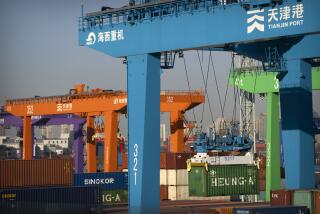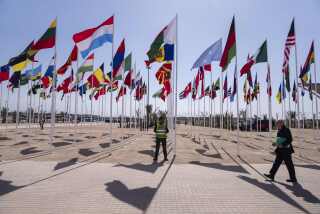IMF Says U.S. Woes Hurt Recovery
WASHINGTON — America’s corporate accountability crisis is sapping the strength of the world economy, the International Monetary Fund said Wednesday as it reduced its estimates of global growth in 2003.
IMF economists said U.S. financial scandals were contributing to a sluggish recovery from last year’s global recession by undermining investor and consumer confidence around the world, depressing markets and slowing the cycle of production and consumption. They predicted the world economy would expand at a 3.7% rate next year, instead of the 4% rebound they forecast six months ago.
The revised estimates are contained in a 246-page World Economic Outlook that will be presented to several hundred world finance officials gathering in Washington for weekend meetings of the IMF, World Bank and Group of 7 industrialized nations.
In an unusual appeal to the thousands of protesters expected to fill the streets, IMF chief economist Kenneth Rogoff praised their idealism and passion but denounced efforts by some to halt the increasing integration of rich and poor economies.
“Anarchy does not breed prosperity,” Rogoff said. “The process of globalization needs to be strengthened, its benefits broadened, but it should not be reversed.”
Rogoff’s search for common ground did not still the institution’s critics. An independent think tank issued a report predicting that the IMF’s efforts to support Brazil’s debt-laden economy are doomed to fail.
An anti-globalization group reported progress in organizing a boycott of World Bank bonds. Protest leaders outlined their plans to disrupt Washington traffic by occupying major intersections.
The chorus of criticism illustrates the increasingly fractious debate about the “Washington consensus” approach to managing globalization.
Nongovernmental organizations have become more aggressive in their attempts to influence actions by the IMF, which acts as lender of last resort for economies in crisis, and the World Bank, which finances programs to promote economic growth in developing countries.
The institutions themselves have become more outspoken in their critiques of policies of member nations. In its report, the IMF scolded the United States, Europe and Japan. Those economic powers say they want to help poor countries, but they are hurting them by subsidizing overproduction of grain and cotton at home, according to the IMF.
The fund offered an equally pointed assessment of forces weighing on the world economy. Besides scandals involving U.S. chief executives, it cited the burgeoning U.S. trade deficit, Europe’s inflexible labor markets and Japan’s reform-resistant banking sector.
Rogoff told reporters there was no “magic elixir” that could cure the ailing economies of Latin America.
The European Union, he said, “needs to decide whether it’s going to be a locomotive in the world economy or a caboose.”
Offering unsolicited advice to U.S. policymakers, the IMF said that more interest rate cuts might be needed to keep the global recovery from faltering and that future tax hikes may be required to prevent the federal debt from ballooning.
Although the IMF does not expect the global recovery to stall, it said growth could be slowed by additional stock market declines, a rapid dollar depreciation or a spike in oil prices accompanying U.S. military action in Iraq.
The fund said Argentina is experiencing an economic contraction of “unprecedented magnitude.”
But it expressed confidence that market anxiety about Brazil’s financial stability would subside after the election of a new president in October.
The fund’s optimism was challenged by the Center for Economic Policy and Research in Washington. The think tank issued a study concluding that Brazil ultimately will be forced to default on its public debt, no matter who wins next month’s elections.
“Not since the fall meetings of 1997, when financial crisis was spreading through Asia, have the IMF and World Bank convened on the brink of such a large potential policy failure,” said economist Mark Weisbrot, coauthor of the study.
*
Staff writer Eddy Ramirez contributed to this report.
More to Read
Sign up for Essential California
The most important California stories and recommendations in your inbox every morning.
You may occasionally receive promotional content from the Los Angeles Times.










